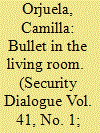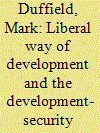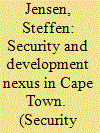|
|
|
Sort Order |
|
|
|
Items / Page
|
|
|
|
|
|
|
| Srl | Item |
| 1 |
ID:
094760


|
|
|
|
|
| Publication |
2010.
|
| Summary/Abstract |
This article investigates the security-development nexus through a study of local experiences in a neighbourhood in Sri Lanka's capital Colombo. As the Sri Lankan state struggles to secure 'the nation' from 'terrorism', and to develop it towards a twin vision of modernization and return to a glorious past, large parts of the population in Colombo 15 remain at the margins of this 'nation'. They are ethnic and religious minorities, forgotten tsunami victims, terrorist suspects and unauthorized dwellers - those often depicted as threats to, rather than subjects of, 'security' and 'development'. This study reveals that the security-development nexus constitutes a complex web of linkages between factors related to housing, income, tsunami reconstruction, party politics, crime, political violence and counter-violence, social relations, and religious beliefs and rituals. People's perceptions of and opportunities to pursue security/development are intimately linked to their position as dominant or marginalized within 'the nation', 'the community' and 'the family'. 'Security' and 'development' issues are mutually reinforcing at times, but just as often undermine each other, forcing people to make tough choices between different types of security/development.
|
|
|
|
|
|
|
|
|
|
|
|
|
|
|
|
| 2 |
ID:
094757


|
|
|
|
|
| Publication |
2010.
|
| Summary/Abstract |
The problems of development and security have historically formed distinct discourses. More recently, they have been inextricably linked both in discourse and in much policy, thus creating the so-called development-security nexus that pervades much of today's international development assistance. The empirical basis for attention to this nexus has been quite obvious given the many humanitarian emergencies occurring in the 1990s. It is less clear what, in terms of linkages, went before and what will come after. This article discusses the putative nexus in different historical geopolitical contexts, probing into its origins and speculating about the shape it may take in the future. It consists of three parts. The first deals with conceptual issues and the overall theoretical framework. The second describes four historical discourses, consecutively prevalent from about 1750 to 1980. The third concerns the current discourse on globalization and its possible future shape: global development.
|
|
|
|
|
|
|
|
|
|
|
|
|
|
|
|
| 3 |
ID:
094758


|
|
|
|
|
| Publication |
2010.
|
| Summary/Abstract |
As the rising death toll among humanitarian aid workers suggests, saving strangers has become a dangerous occupation. In addressing the consequences of this increase, this article begins by placing the development-security nexus in its historical context. While it has long been associated with liberalism, two factors distinguish this nexus today: first, the global outlawing of spontaneous or undocumented migration; second, the shift in the focus of security from states to the people living within them. Reflecting these moves, policy discourse now conceives development and underdevelopment biopolitically - that is, in terms of how life is to be supported and maintained, and how people are expected to live, rather than according to economic and state-based models. The household and communal self-reliance that forms the basis of this biopolitics, however, has long been in crisis. Since the end of the Cold War, the destabilizing forms of global circulation associated with this emergency have been reconstituted as threats to the critical infrastructures that support mass consumer society. A new security terrain now links the crisis of adaptive self-reliance with risks to critical infrastructure within a single framework of strategic calculation. Rather than ameliorating the generic life-chance divide between the global north and south, the development-security nexus is entrenching it.
|
|
|
|
|
|
|
|
|
|
|
|
|
|
|
|
| 4 |
ID:
094754


|
|
|
|
|
| Publication |
2010.
|
| Summary/Abstract |
It is now beyond doubt that attention to the 'security-development nexus' has become commonplace in national and global policymaking. However, how 'the nexus' is differently imbued with meaning and ultimately employed remains underexplored. In this article, we suggest a possible framework for mapping the multiple understandings that underlie specific articulations of 'the nexus' in order to reveal the ways in which meaning may shift in different (yet seemingly similar) discourses. To this end, we draw upon familiar stories about 'development' and 'security', and we offer a brief reading of ways in which 'the nexus' is articulated in policy texts. Ultimately, this framework may hint at what such articulations may imply for the policy agenda.
|
|
|
|
|
|
|
|
|
|
|
|
|
|
|
|
| 5 |
ID:
094759


|
|
|
|
|
| Publication |
2010.
|
| Summary/Abstract |
In this article, I argue that the security and development nexus takes on specific forms depending on the context, and that in Cape Town's coloured townships it is embodied in policies and practices around what has come to be known as the 'war on gangs'. Furthermore, the war on gangs in Cape Town bears resemblances to counterinsurgency strategies - not least in the sense that both are responses to a similar problem of governance. This comparison allows us explore how citizenship is being reconfigured for residents of the townships in ways that resemble what James Holston (2007) calls 'differentiated citizenship'. Such differentiated citizenship is opposed to the universal inclusivity promised by post-apartheid South Africa. By exploring the specific merging of security and development in the Capetonian war on gangs as compared to counterinsurgency and the subsequent reconfiguration of citizenship, I am able to address a central question: How - and with what consequences - does power maintain itself when faced with an onslaught from those that it restricts to the margins of institutions and social life?
|
|
|
|
|
|
|
|
|
|
|
|
|
|
|
|
|
|
|
|
|